
I was driving the last car in our three car convoy on the way to the town of Sderot for a most singular meeting. The order was fitting somehow. My sons were driving the first two, and it was not the only way in which they had overtaken me in recent years. Now my daughter – the last of them to grow up – was doing the same. What she was asking of us, her mother and me just before her wedding, was a bit too much. True, we’ve always tried to be supportive. Like the mother in The Runaway Bunny: “If you cross a river, I’ll swim over to you. If you climb a mountain, I’ll climb after you”. But, this was one hell of a mountain; and I was not sure I was up to it.
The mobile phone rang. It was the caretaker son. He wanted to know how were we doing. Did he mean just the driving, I wondered? “Okay,” I answered, not sure myself what exactly I was referring to. “Good, we’re waiting for you at the Yad Mordechai gas station. Sderot’s about ten minutes after that.”
A short drive but what a step. In my 65 years I knew of no one who’d been asked to do what my daughter was now requesting. To the east were vast dead fields of cut wheat stalk waiting for rains still weeks away. One had to be hopeful.
When we got to the gas station, they were all waiting. My daughter and her soon-to-be husband, my three sons, the daughters-in-law, the grandson. Concern on their faces. They were worried about my wife and me. The tables had turned.
More gentle and hesitant than Kassam missiles, our convoy steered into Sderot, ambivalently searching out the right street, the one on which my daughter’s birth family was waiting. She had wanted to fill in the gap in her past before her wedding and so without telling us had gone and found them, a large clan that had survived the six year rocket barrage. When they had met a week earlier, they hadn’t talked much about that. There were so many other things to catch up on. Now she was bringing us together, as she wanted to do with the various sides of herself.
I saw a crushed roof and air raid shelters being built onto private dwellings, giving people the feeling everything would go on forever. As we’d always had with my daughter. That is, until she’d located these people. Until she’d met her birth father. He’d be there too, and tens of relatives from all over the Negev who’d heard about the miraculous re-appearance of the beautiful, poised woman taken from them as an infant 23 years ago and given to strangers.
What would they want from us, these people from the South? What did my daughter want from us? Was this to be a hello or a goodbye? Had we finished our job? I’d need all the hope I could muster.
From a gate on the right a smiling young man with yellow shirt springs into the street, waving us into parking spaces. We all step out, and he is offering me and the others his hand. “I’m M. Y’s son.” Who in the world was Y? Who was this fellow? How had I gotten here to this Negev home, so far from my own in Kfar Saba, not to speak of my birth one in the USA I’d left so many years ago. I took his hand automatically. My family followed him through the gate into the house, and I followed my feet.
The ground floor was on two levels. The higher level was the kitchen area; the lower, the living room. Framed Renaissance reproductions were on the walls, a gold-plated, old-fashioned hearing apparatus on a floor stand. Glass sculptures of lions and tigers placed around. Next to the entrance in a place of honor, M’s university diploma. Chairs had been set around in a large circle in the lower area. Y (Now I got it; it was her house) motioned for us to sit down. All in a row, and I was happy to have my daughters-in-law there. My daughter sat next to them, looking lovely.
Y’s people sat down facing us. I immediately identified the biological father. A middle aged, good looking man in black pants and black open-necked shirt, whose slow, heavy body movement suggested medication. His face was blank, and it was impossible to figure what he was thinking. He, too, was looking around at us. I found myself wondering if he expected to stand under the chuppa.
There was another man with a kippa on his head and a white shirt covering a large stomach, squirming in his chair eager to begin talking. His wife, Y, beat him to it. “All these years we’ve been looking for her. We’re eight brothers and sisters. Our mother died two years ago, and her last words were of sorrow we couldn’t find her.” My daughter sat on the edge of her chair, alert. My wife became tearful.
I asked the man in the kippa what he had heard about us? “That you are some kind of therapist.” He moved forward in his chair and asked deferentially, “As a psychologist, what do you think about . . .” I stopped him with a hand gesture and said that here I was just a father. Some people looked between me and the birth father, and I could feel my stomach move.
On the upper level there were more and more people: children, adolescents (serving cakes), an older religious woman, some relatives, neighbors. I lost track of who belonged to whom. A small, unshaven older man reached up, kissed my forehead and said a blessing. A woman looked at my daughter and exclaimed, “My God, she looks just like her!” (The “her” clearly a reference to the birth mother, long dead.) I listened and watched.
Y. was explaining what we had never known, that this family (the birth-father’s) had tried to keep my daughter to raise her as their own. So had the birth mother’s family. There was a fight. The authorities intervened, and Y. and her mother gave her over for adoption. Ever since - twenty two years,- they had had no idea of what had become of the little girl. Until three weeks ago, now all grown up, she had contacted them.
When the house became too crowded, everyone moved to the courtyard. We sat around the long table with plastic plates of nuts and fruits and cheeses. Some people remained standing. There were fruit drinks and soda. The man with the kippa gave me a bottle of wine and a corkscrew. It was a gesture of respect, and I made a flourish of opening it. Something opened in me as well.
There was more talk. “I’m a teacher”. “My daughter is a social worker.” “My father’s brother is the deputy mayor.” A handsome army officer came in carrying a child. A young woman officer in uniform was talking to an old lady, her hand on the woman’s shoulder.
My boys were working the crowd, like their Dad would have done if he hadn’t just been sitting there taking it all in. My wife was at first quiet and held back. Then, she began telling the story of the day we got our daughter and the first year before we received the formal adoption papers. A difficult year in which we became attached to her and were so afraid we might have to give her back. Some older women were nodding, understanding.
By now, I had lost my earlier sense of foreboding. These were good people, the “salt of the earth”, who’d had their share of misfortune. I asked Y. to request quiet, raised my glass of wine and said, “This is a movie with a happy ending. We are delighted to have found this good family from which my daughter (I emphasized her relationship with me) came. As you can see (I pointed around to my children, all grown up these many years) we are also a good family. My daughter has cleared up the mystery of where she came from. Now she can get married and begin the next chapter of her life.” I tried to keep it short since my number 3 son had told me recently that, with all due respect, I tend to get carried away as I get older. My number 2 daughter-in-law was stroking my back. It seemed my little toast had hit the spot with her. And maybe with others, for there was some clapping.
The talking resumed. The man in the kippa asked me to come to the back of the house, together with one of my sons. He showed us where he was building a new air raid shelter, and I saw that there were similar ones all along the street like sore bunions attached to every house. Other people joined us, and we listened to their stories of how missiles had rained down everywhere. After a while, I suggested we return to the patio, where the happier feeling seemed to be.
We stayed another half hour, mingling and hearing occasional mention of the Sderot war reality and hints of a large family dynamic beyond my understanding. Still, it was clear that my daughter’s reappearance and this meeting of families would help erase a great stain with which they have been living for two decades. I also began thinking of the wedding to be held in four days and to yet another toast I would be making, this time to three families.
At a certain point we began to make departure signals. The man with the kippa called me into the kitchen and took out two bottles of brined olives and lemon. He wrapped them with care and put them in my hands, explaining that they had been made by his wife according to a special family recipe. I thanked him and went outside and joined my own family who were moving towards the gate. Someone took my hand and enthusiastically told me that any time we were in the neighborhood we should drop in. Then we got into the three cars and pulled out, waving. The Sderot people were waving back.
I was driving my car. My pregnant daughter-in-law was sitting in the front passenger seat. In the back were her husband (my number 2 son), my daughter and my son-in-law to be. We got back to the highway and began our drive north, the fields of dead wheat stalks disappearing in the gathering darkness. Over the hill to our west, out of sight, lay Gaza and the destroyed Israeli settlements left behind some years before. What a day! What a place, My Israel! I looked in the rear view mirror at my daughter. She was glowing and when she saw me gazing, she smiled back. I felt there was no doubt in her mind who was her father.
Eric Moss
By Carl Hoffman
Anyone who reads Eric Moss’, “Convoy to Sderot,” will no doubt want to know what happened next, and how it all ‘turned out.’ “It turned out beautifully,” Moss says. The story, told by a man whose adopted daughter decides to meet her biological family in Sderot shortly before her wedding, closes after the tense but successful meeting of the two families, adoptive and biological.
“Two months later, my daughter had her wedding. The Sderot family was invited, and it was a wonderful celebration of three families—our family, the husband’s family, and my daughter’s biological family. They all showed up for the wedding, and there was a very happy, festive atmosphere. It was quite special,” Moss recalls.
A native of the U.S. state of New Jersey, Moss, 66, has spent the last 40 years of his life here in Israel. Married with four children and one grandchild, Moss holds a Ph.D. in his career profession of clinical psychology. Aside from writing numerous professional articles in his field, Moss has written, he says, “quite a few newspaper articles, as well as seven articles that have been published in ESRA.” In addition, Moss has written and published one novel, The Jerusalem Syndrome, to enthusiastic reviews both in Israel and the United States.
We can no doubt expect more writing from Moss in the months and years ahead. He says, “It’s an ongoing project of mine, to write and to publish.”
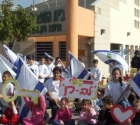 LEV-RAN SCHOOL: A LOVE STORY (new)
LEV-RAN SCHOOL: A LOVE STORY (new) DEAR EDITOR 154
DEAR EDITOR 154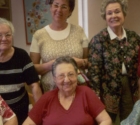 KNITTING CLUBS: TEL AVIV'S KNITTING & CROCHET SOCIAL CIRCLE
KNITTING CLUBS: TEL AVIV'S KNITTING & CROCHET SOCIAL CIRCLE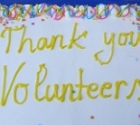 A new website in English - on Volunteering - Launched in Israel
A new website in English - on Volunteering - Launched in Israel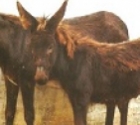 Help Needed for Abused Horses and Donkeys
Help Needed for Abused Horses and Donkeys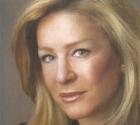 Heather's Heseg
Heather's Heseg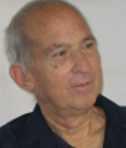 Eric Moss
Eric Moss